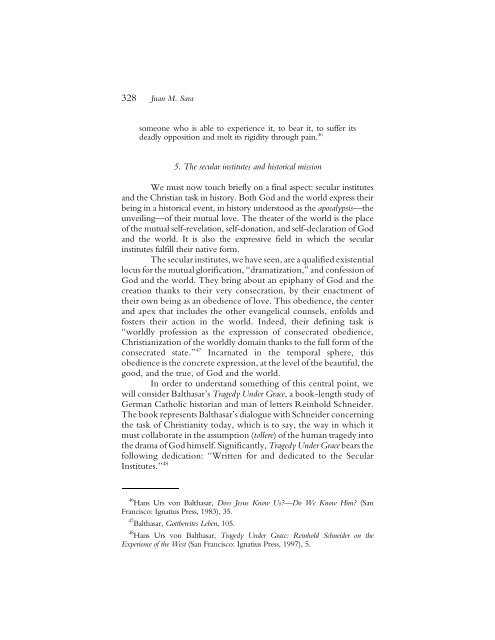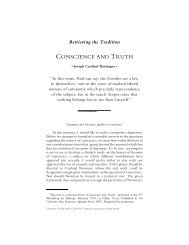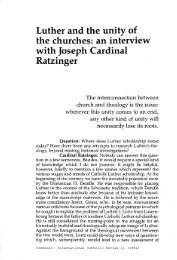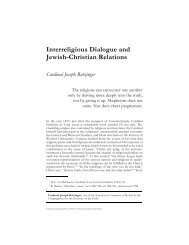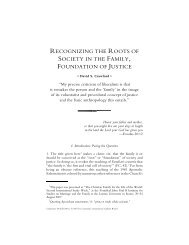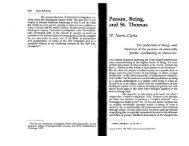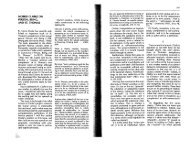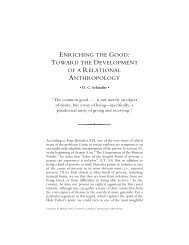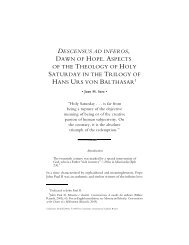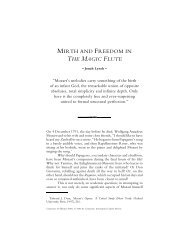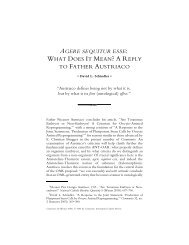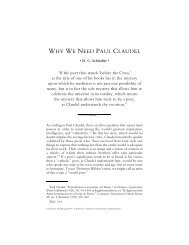Juan Sara. Secular Institutes According to Hans Urs ... - Communio
Juan Sara. Secular Institutes According to Hans Urs ... - Communio
Juan Sara. Secular Institutes According to Hans Urs ... - Communio
Create successful ePaper yourself
Turn your PDF publications into a flip-book with our unique Google optimized e-Paper software.
328 <strong>Juan</strong> M. <strong>Sara</strong><br />
someone who is able <strong>to</strong> experience it, <strong>to</strong> bear it, <strong>to</strong> suffer its<br />
deadly opposition and melt its rigidity through pain. 46<br />
5. The secular institutes and his<strong>to</strong>rical mission<br />
We must now <strong>to</strong>uch briefly on a final aspect: secular institutes<br />
and the Christian task in his<strong>to</strong>ry. Both God and the world express their<br />
being in a his<strong>to</strong>rical event, in his<strong>to</strong>ry unders<strong>to</strong>od as the apocalypsis—the<br />
unveiling—of their mutual love. The theater of the world is the place<br />
of the mutual self-revelation, self-donation, and self-declaration of God<br />
and the world. It is also the expressive field in which the secular<br />
institutes fulfill their native form.<br />
The secular institutes, we have seen, are a qualified existential<br />
locus for the mutual glorification, “dramatization,” and confession of<br />
God and the world. They bring about an epiphany of God and the<br />
creation thanks <strong>to</strong> their very consecration, by their enactment of<br />
their own being as an obedience of love. This obedience, the center<br />
and apex that includes the other evangelical counsels, enfolds and<br />
fosters their action in the world. Indeed, their defining task is<br />
“worldly profession as the expression of consecrated obedience,<br />
Christianization of the worldly domain thanks <strong>to</strong> the full form of the<br />
consecrated state.” 47 Incarnated in the temporal sphere, this<br />
obedience is the concrete expression, at the level of the beautiful, the<br />
good, and the true, of God and the world.<br />
In order <strong>to</strong> understand something of this central point, we<br />
will consider Balthasar’s Tragedy Under Grace, a book-length study of<br />
German Catholic his<strong>to</strong>rian and man of letters Reinhold Schneider.<br />
The book represents Balthasar’s dialogue with Schneider concerning<br />
the task of Christianity <strong>to</strong>day, which is <strong>to</strong> say, the way in which it<br />
must collaborate in the assumption (<strong>to</strong>llere) of the human tragedy in<strong>to</strong><br />
the drama of God himself. Significantly, Tragedy Under Grace bears the<br />
following dedication: “Written for and dedicated <strong>to</strong> the <strong>Secular</strong><br />
<strong>Institutes</strong>.” 48<br />
46 <strong>Hans</strong> <strong>Urs</strong> von Balthasar, Does Jesus Know Us?—Do We Know Him? (San<br />
Francisco: Ignatius Press, 1983), 35.<br />
47 Balthasar, Gottbereites Leben, 105.<br />
48 <strong>Hans</strong> <strong>Urs</strong> von Balthasar, Tragedy Under Grace: Reinhold Schneider on the<br />
Experience of the West (San Francisco: Ignatius Press, 1997), 5.


